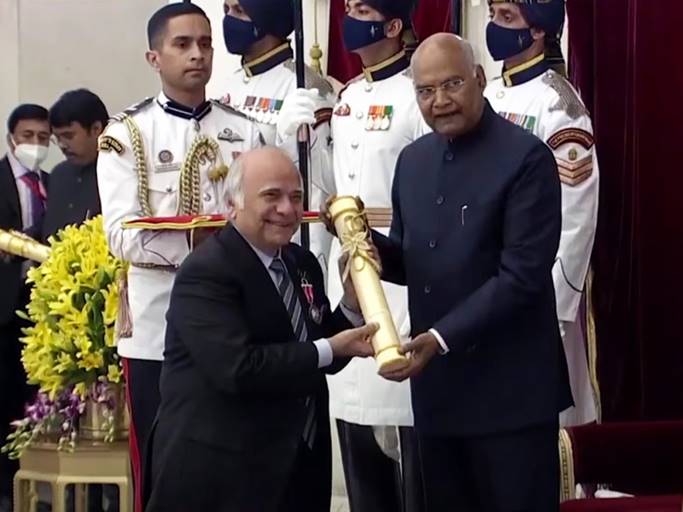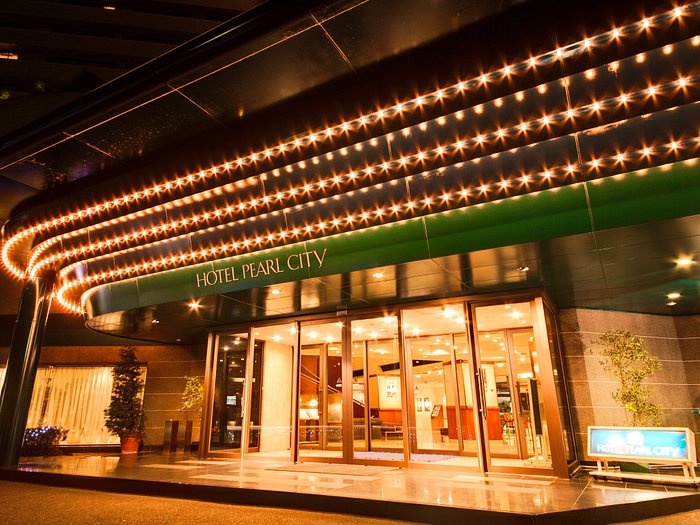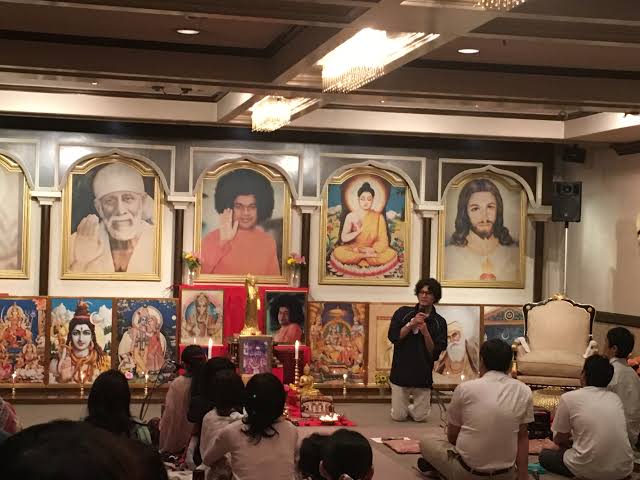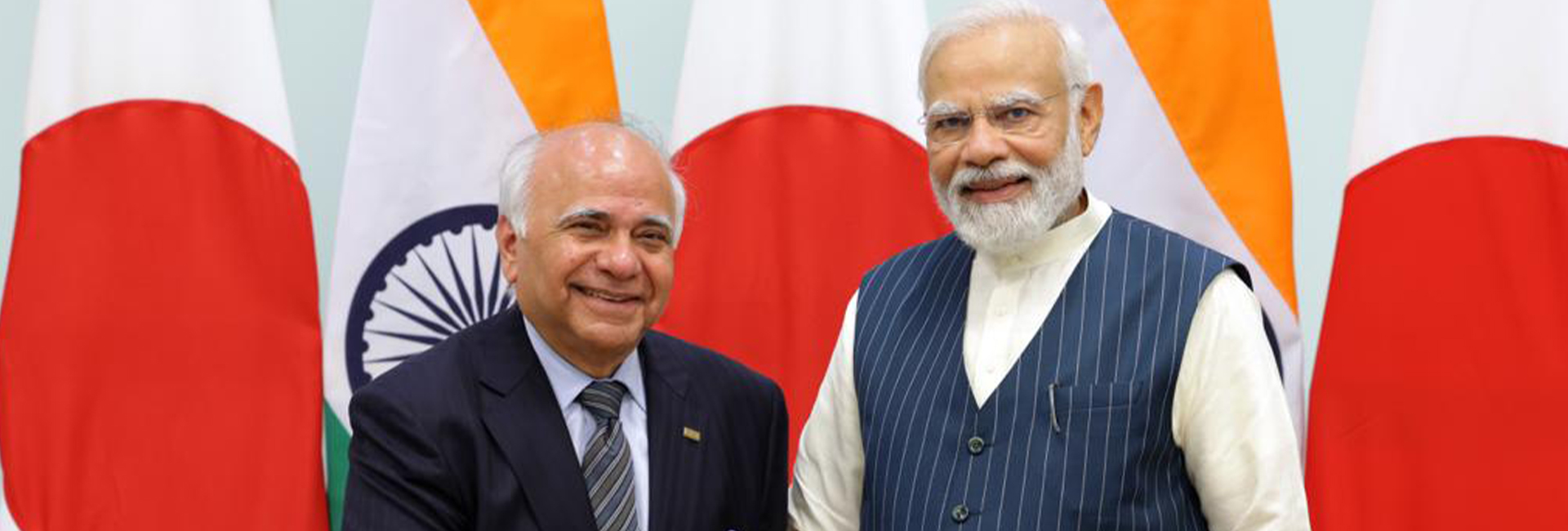(October 2, 2024) It was in 2022 that Ryuko Hira found himself accepting the Padma Shri award from the then President of India – Ram Nath Kovind – for his contribution to trade and industry. Having played a pivotal role in India-Japan trade relations, the President of HMI Hotel Group in Japan, Ryuko moved to the land of rising sun in 1966. Over the years, he found strong ground as a hotelier, investor, and philanthropist in Japan, who became widely recognised for fostering Indo-Japan economic ties, advancing Indian cultural outreach, and his steadfast devotion to Sri Sathya Sai Baba.

Ryuko Hira received Padma Shri in 2022
Pioneering Indo-Japanese Trade Relations
Born as Kamlesh Punjabi in Jaipur in a family of Jagtianis who were in the business of procuring jewels and ornaments from Muslim Royalty or Mirs. Over the years, the family expanded their business across Southeast Asia and Japan. Taking advantage of the Anglo-Japanese Alliance (1902-1922) which allowed 50 Indian companies to set up operations in Japan, Hira’s uncle partnered with a firm in Yokohama. Soon he expanded into the export of silk and seeing the business flourish, other family members joined him. After the Great Kanto Earthquake, the business shifted base to Kobe and they switched to buying cultivated corals for export to India. Post WWII, Japan saw a period of intense industrialisation and the businesses grew rapidly. Keeping up with the modernisation, Hira’s two brothers established offices in Singapore, Thailand, and Hong Kong in 1950, around the time when Hira was born.
After attending school in Mumbai, Hira graduated in gemology from the Gemological Institute of America and even attended a 12-week course at the Cornell University School of Hotel Administration. But things took a U-turn after tragedy hit their family as Hira’s father, uncle, and eldest brother passed away in the same year, leaving Hira with the option of stepping up. He left for Hong Kong to learn the tropes of business from his elder brother, and soon the business shifted base to Tokyo in 1966.
Kamlesh Punjabi to Ryuko Hira: A Journey of Transformation
Being born in the same year as independent India, growing up, Hira saw three wars with China and Pakistan. “I was fortunate as my family had some small overseas business which is now nearly 100 years of age. As soon as I finished high school, the Pakistan and the Chinese wars were going on and the ladies and the young ones at home were sent abroad for safety. So a decade later in the 1970s, the situation in India got from bad to worse,” said Hira in an interview, adding, “Being a stateless refugee family from Sindh, Pakistan where we had lost and left everything due to the partition (of India and Pakistan), we did not want to live in poverty once again. So my eldest brother said one family member should become a Japanese national to save the family’s assets from being nationalised in foreign countries.”

Ryuko Hira with former Japan PM Shinzo Abe
Being a little fluent in Japanese, thanks to the language course from Sophia University, Tokyo, he turned out to be the perfect family member to achieve the feat. He married a Japanese woman, became a naturalised Japanese citizen, and adopted the name Ryuko Hira. However, he was initially hesitant to change his name and give up on Indian nationality. A disciple of Sathya Sai Baba, he spent some time at the sacred Mount Fuji asking for guidance from Baba. “I came back with the answer that a passport document of nationalisation doesn’t make you an Indian or another national. As Baba said – a true Indian is a person who carries the divine values in his heart,” he added. Moreover, the reason for changing his name took root in the fact that Japanese language is calligraphic. They don’t use alphabets, instead the pictorial characters make the Japanese script. It was a priest at a Hindu temple on top of Mt Hira in Shiga who gave him the name. “Hira is the name of the mountain on which the temple stands and in Ryuko, ‘Ryu’ means the dragon and ‘ko’ means tiger,” he revealed in an interview.
The HMI Hotel Group: Building a Hospitality Legacy
Over the years, Hira expanded his business to such great success that it became one of the leading foreign enterprises in Japan. So much so that the achievement was highlighted in a one-hour special documentary aired by Japan’s National Television, NHK in 1984. After the untimely death of his elder brother in 1986, the family business was divided harmoniously, with Hira taking responsibility for the real estate development sector. Drawing on his talent, experience, and the traditions of his family lineage, the Global Indian went on to establish the foundation of the Ora Group of Companies in 1986.
In four years, he established the HMI Hotel Group, which now welcomes over 13.7 million guests each year and has been recognised by the Nikkei Marketing Journal as the eighth-largest hotel chain in Japan. Hira’s group of companies also excels in various areas, including proprietary hotel management, hotel management services, capital raising through building leases and trusts, hotel planning and development, property management, technical consulting, and the hotel supplies industry.

Hotel Pearl City in Kobe
Strengthening Indo-Japanese Relations
Apart from being a businessman and investor, Hira has played a significant role in strengthening Indo-Japanese affairs. In June 2004, he became the first Indian to be elected as a Director of the Japan-India Association. He also serves as the representative director of the Sai Hira India Foundation, a charitable organisation dedicated to fostering public benefit between Japan and India through tourism, economics, philosophy, and culture.
The growing Indian community in Japan, though modest in size, has played a vital role in fostering trade and cultural exchanges between the two nations, exemplified by figures like Ryuko Hira. The Indo-Japanese trade relationship has evolved into a robust partnership, with Japan being one of India’s largest investors, particularly in infrastructure, technology, and automobiles. India’s exports to Japan include textiles, seafood, and chemicals, while Japan’s exports to India focus on machinery, vehicles, and electronics. Figures like Hira have not only bridged economic ties but also fostered mutual respect and cultural integration, underscoring the shared values that strengthen the partnership between the two nations.
Spiritual Values Guiding Business and Philanthropy
A strong advocate for Indian culture and traditional values in Japan, he has established prayer halls across the country where Japanese men and women gather to chant the Vedas and sing bhajans. At these prayer halls, volunteers also prepare 20,000 meals annually to support homeless individuals. Hira explained that all volunteers recite hymns and prayers while cooking, offering blessings for the recovery of the homeless. Having established five prayer halls dedicated to community service, he describes this work as both the passion and mission of his life. In October 2019, Hira organised the foundation stone ceremony for the Sri Sathya Sai Sanathana Samskruti – Spiritual Centre at Tsumagoi Resort – Sai No Sato. This project aims to enhance cultural exchanges between India and Japan.

Sri Sathya Sai Prayer Hall in Tokyo
Ryuko Hira’s journey from Kamlesh Punjabi to a respected figure in Japan shows his commitment to connecting India and Japan in both business and culture. He has made significant contributions to the hospitality industry and engaged in charitable work, promoting Indian spiritual values in Japan. As a businessman, Hira grew his family’s legacy into a successful company, and as a philanthropist, he helped strengthen ties between the two countries. His desire to give back to society, inspired by his faith in Sri Sathya Sai Baba, continues to motivate him. Today, Ryuko Hira is not just a symbol of strong India-Japan relations but also an example of how cultural exchange, humanitarian work, and a life guided by spiritual values can make a difference.




